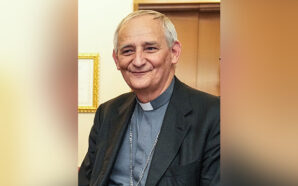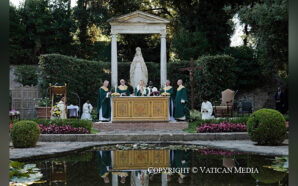His room in the Mater Ecclesiae Monastery in the Vatican is now empty, though its arrangement still suggests him. The footfalls in the garden below the windows of the rooms where he studied and received visitors and slept, which in his last month let in dim light, are no longer heard by him. The long journey, braided together in the last few years by fatigue and hope, is accomplished. The portal has opened and swallowed his soul in its crystalline yet intimate light, leaving behind his body for our mourning, which in its frailty and brokenness speaks of winter and withering, of the grass that dies, while intimating a more, a stupendous abiding that resides in the power and love of God who is the future more than the future.
On New Year’s Eve 2022 Pope (Emeritus) Benedict XVI passed over into the mystery of the One who laid down his life for the world and our quivering flesh and into the depths of the communion of saints. To the extent to which his own profound meditations on death prognosticated correctly, he verified in the process of his own death that he was never truly alone, that in the moments of darkness, God was always there, and that in the moments of isolation, he was never truly an atom, but loved, remembered, and hoped for by the living and the dead with whom he was connected by an unbreakable bond. Having ruminated and chewed on “the last things” for much of his life, perhaps the peace and the rest might not surprise as Benedict “passed over.”
Benedict would cast his life as a joyous one, given his sense of the presence of God in prayer and sacrament and his abiding sense of mission and commitment to the tasks in order of scholar-priest, theological expert at Vatican II, bishop, cardinal, head of Congregation for Doctrine of the Faith, Pope, and Pope Emeritus. Over a long and very public life, there was pomp and ceremony. Honors were offered, prestige bestowed that Joseph Ratzinger, who would become Pope Benedict, did not shirk, even as he would insist that these were correlative to the office, and not to the person whose main goal was to pour himself out in order to conform as much as was humanly possible to the office.
This is neither ex post facto construction nor alibi: it is the only way to make sense of a simplicity, modesty, and personal warmth that even Benedict’s many detractors would admit. If his was a truly ardent life of loving God, his life was in its own way arduous, though in an entirely different way than that of his beloved predecessor, Pope John Paul II. His person was not as charismatic, his life not as dramatic, and the quantity and quality of his suffering not so obvious. Yet his life was in its own way a life of suffering, in equal parts structural and contingent.
To continue reading this article, click here.
Cyril O’Regan is the Catherine F. Huisking Chair in Theology at the University of Notre Dame. His latest book is the first installment of a multi-volume intellectual history of Gnosticism in modernity, The Anatomy of Misremembering, Volume 1: Hegel.
With thanks to Church Life Journal, a journal of the McGrath Institute for Church Life at the University of Notre Dame, Notre Dame, Indiana, where this article originally appeared.









